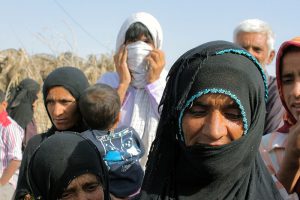On October 6, the Department for Women’s Development in Balochistan announced the approval of the “Gender Equality and Women Empowerment Policy” for the provincial government. But many journalists and activists complain that women from different parts of the province were hardly consulted before officials drafted and approved a policy for them. And after the approval and announcement, the actual policy document and information have not yet been made public, making it hard for women to find out what, exactly, the policy means for them, and whether or not it will make life easier for them and their daughters.
This is not the first time women have not been consulted on a bill that supposedly aims to improve their lives. In 2014, the Balochistan Assembly passed a bill to outlaw domestic violence. But as activist and researcher Dr. Fouzia Saeed said, “The legislators in Balochistan Assembly did not even make important changes and corrections in the bill… And they passed a bill that initially did not address and criminalize domestic violence the way it should.”
It is critical for policymakers and legislators to evaluate the complexity of issues they are trying to respond to. To do that, they must seek the input of those who are directly affected.
Often, voices of young girls and women in rural areas are neglected as they are considered uninformed. But these girls and women can tell their stories of deprivation and oppression in a way no one else can. These stories are powerful; they can pose solutions that would never occur to well-educated and formally dressed officials. Policies corresponding to social realities carry weight, even if they are not implemented consistently.
For instance, it will be nearly impossible to improve the lot of Balochistan’s women and girls without ensuring their access to education. Despite having literacy rates for women as low as 18 percent in Balochistan and having over 75 percent of young girls out of school, key initiatives are still missing to change these statistics, which have remained stagnant for years now.
Balochistan allocates less than 17 percent of the provincial budget for education. The lack of effective changes in the provincial education system, especially in rural areas, leads children, young girls in particular, to remain out of school.
The lack of options for girls from disadvantaged backgrounds is a bigger problem. When there is no education to get, there are no economic opportunities. This leads to another critical issue: early marriages and maternal mortalities.
Nearly six out of every 10 girls in Balochistan are married before the age of 20. That, coupled with the lack of basic healthcare facilities across Balochistan, ensures that maternal mortality in the province remains the highest in the country, at 785 deaths per 100,000 compared to 272 per 100,000 for Pakistan as a whole.
In 2018, during the last cabinet of the Balochistan Assembly, Dr. Shama Ishaq presented a bill to outlaw early marriages, in the same way Sindh and Punjab provinces have already outlawed it according to the limits set by a 1961 ordinance. The updated legislation allows registration of a case and empowers police to stop a child marriage. But in Balochistan, an act from 1929 still governs, which does not allow registration of a case for underage marriages, nor does it allow police to take notice. The bill presented by Ishaq has not been taken up to this day.
There is no evidence that the anti-child marriage law has been completely effective in Sindh and Punjab, but the existence of such a law at least allows a few cases to reach the police and courts.
Cultural practices like early marriages trap young girls, making it harder for them to earn a living as adults. Therefore, compared to other Pakistani provinces, female labor force participation is also the lowest in Balochistan – only 5.06 percent of women in the province are currently part of the paid labor force.
The lack of gender-segregated data on poverty is yet another problem. There is no way to find out how poverty is affecting women and young girls in particular. Their standards of living and chances for getting an education are partly affected by poverty. In poorer societies, century-old norms dominate lives, such as early marriages but also including honor killings, one of the most extreme forms of domestic violence. Often young girls become victims of this custom, but there is very little to no data and research on the issue. Hence, when drafting policies, these issues are hardly noticed.
When there is no action to counter and stop an existing issue, it continues to grow more serious. There is a need for political will and consensus to tackle the interlinked issues facing women, including reevaluations of decisions already made. Only collective action can make things different from how they have always been. The voices of people matter; the voices of young girls in one of the most unheard parts of the world matter. Inclusive laws and policies that make lives easier for girls will eventually turn them into strong women, who would not only live better lives but in turn make life easier for others around them.

































